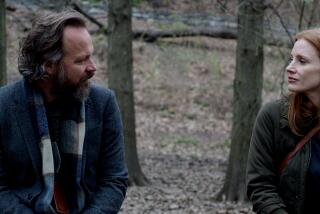The Power of Memory to Test Love’s Bounds
- Share via
Truth is the oxygen of love. This ancient but easily forgotten verity is at the heart of Margot Livesey’s clever, lively, sometimes hilarious new novel “The Missing World,” which follows a group of up-to-date Londoners through their romantic mishaps and existential quandaries.
The book is also a meditation on the moral economy of memory--on the price, that is, of denying what one has done and who one is. Livesey’s book reminds us that in love, as in history, those without memory are condemned to a lifetime of weary, farcical repetitions.
Hazel, a 31-year-old freelance journalist, has left her live-in lover, Jonathan, after discovering his multiple deceptions. (Among other things, he hid the unimportant fact that, in his previous relationship, he had fathered and abandoned a child.) Soon thereafter, Hazel has an accident that results in a head injury; she becomes prone to debilitating, terrifying seizures and loses her memory of the past three years.
For Jonathan, this is exhilarating news; Hazel’s amnesia provides him with “the ultimate second chance,” the opportunity to re-create their former life “without the mistakes.” Jonathan takes Hazel back into his house under the aegis of nursing her, and in the hopes of winning back her heart.
Which depends, of course, on Hazel’s continuing amnesia; Jonathan knows that Hazel will bolt if she remembers what happened between them. Thus the struggle--creepy and intense--between the former lovers ensues. Hazel wants, more than anything, to regain her memory; Jonathan needs, more than anything, to prevent that memory from emerging. For Hazel, truth is liberation; for Jonathan, it is the barbarian at the gate that he must keep out at any cost, even if that cost is destroying Hazel’s sanity. Yet it soon becomes apparent that though Hazel is ill, damaged and dependent, Jonathan is the emotional amnesiac, and therefore the true cripple.
Jonathan views himself as a great romantic--so loving! so protective!--but he is a manipulative creep who mistakes his obsessions for love. (It is a very bad sign that he refers to his most grotesque betrayal--which we learn of only late in the book, and which concerns not his hidden child but something even greater--as “my slip-up.”) He is a shameless liar too; indeed, “The Missing World” is a dark primer on how to lie successfully. (Rule No. 1: Never hesitate when confronted.) For a man like Jonathan, there can be no true second chances, since he cannot learn what went wrong the first time.
Swirling around Hazel and Jonathan is a cast of oddballs: Charlotte, a neurotic failed actress with a peculiar relation to reality; her sister Bernadette, a no-nonsense nurse; and Maud, Hazel’s best friend who is well-versed in her own forms of betrayal. (Maud is a florist who will disabuse you of all romantic notions about that profession: “Most people buy flowers at times of crisis: death, love. . . . They expect a dozen roses to change their lives.”)
Most important is Freddie, an African American expatriate who works as a roofer and is haunted by his own disturbing memories. Unlike most of Livesey’s characters, Freddie knows the difference between imagination and delusion, and he is blessed with the gift of kindness.
At one point Charlotte, who is “hopeless” at love and work and money, insists: “We repeat what we remember. Only forgetfulness sets us free.”
Like so much that Charlotte believes, this proves untrue. Ultimately, it is Jonathan whose “missing world” expands and whose losses multiply, though he still does not understand why. The last line of this book makes the unshakable strength of his delusions absolutely clear; it is a shocker that made this reader sit up with a jolt.
More to Read
Sign up for our Book Club newsletter
Get the latest news, events and more from the Los Angeles Times Book Club, and help us get L.A. reading and talking.
You may occasionally receive promotional content from the Los Angeles Times.










